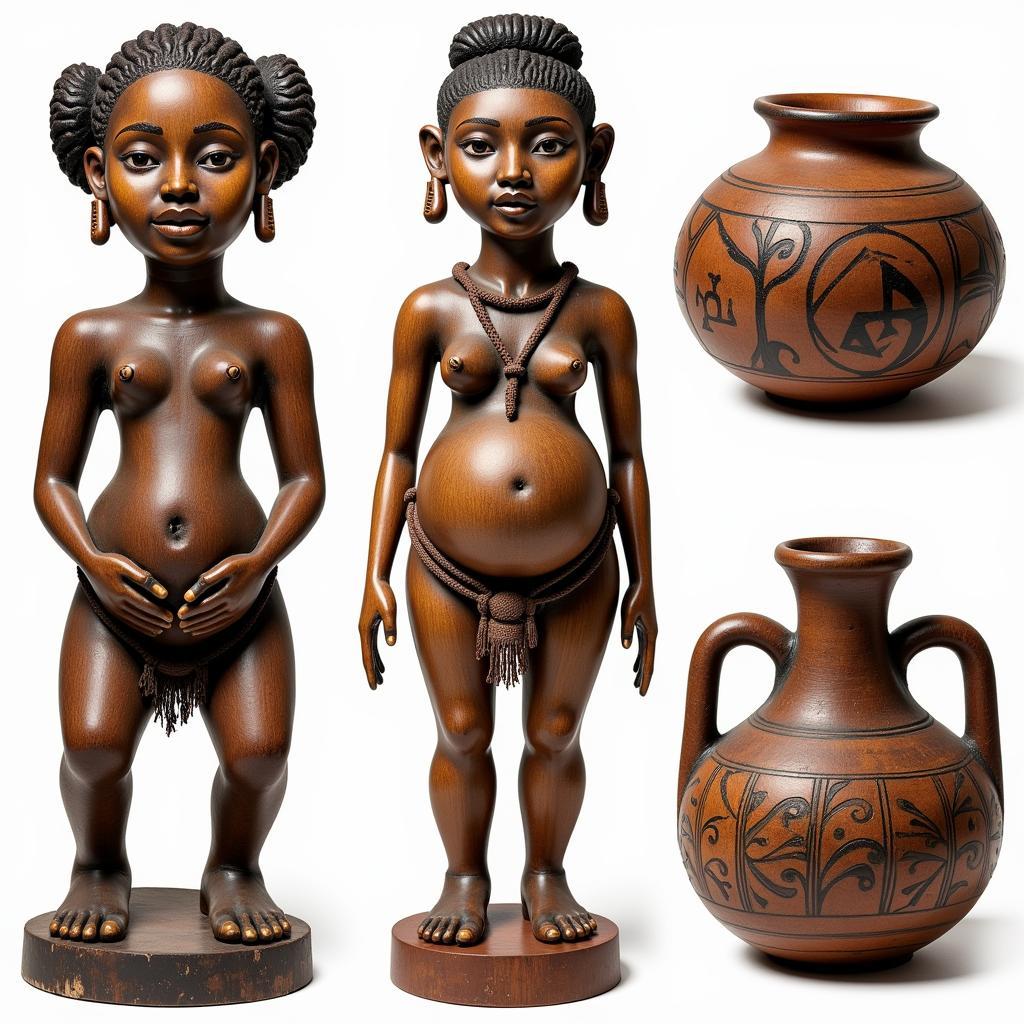African Culture and Fertility: A Deep Dive
African culture and fertility are deeply intertwined. From ancient rituals to contemporary practices, the desire for children and the celebration of life’s continuity are central themes across the continent. This exploration delves into the rich tapestry of beliefs, customs, and artistic expressions surrounding fertility in Africa.
The Significance of Fertility in African Societies
Across diverse African cultures, fertility is not merely a biological function but a profound spiritual and social value. It represents the continuation of lineage, the prosperity of communities, and the very essence of life’s cyclical nature. Children are often seen as a blessing, a source of wealth, and a link to the ancestral world. This reverence for fertility is reflected in various art forms, rituals, and social structures. For instance, in many communities, african fertility rituals are performed to invoke the blessings of ancestors and deities associated with procreation.
Exploring Traditional African Fertility Rituals
Traditional African fertility rituals vary widely across the continent, reflecting the unique customs and beliefs of different ethnic groups. These rituals often involve specific dances, songs, offerings, and prayers aimed at appeasing the spirits and ensuring successful conception and childbirth. Some rituals involve symbolic representations of fertility, such as sculptures, masks, and body painting.
What are some common elements found in these rituals? Many rituals incorporate elements of nature, such as water, earth, and plants, which are seen as symbols of life and growth. They often involve community participation, emphasizing the collective responsibility for ensuring the continuity of life.
 African Fertility Symbols: Sculpture and Pottery
African Fertility Symbols: Sculpture and Pottery
Art and Symbolism: Expressions of Fertility
African art is replete with symbols and motifs representing fertility. Sculptures of pregnant women, stylized masks, and intricate patterns on pottery and textiles often convey messages related to procreation, abundance, and the life cycle. These artistic expressions not only celebrate fertility but also serve as powerful reminders of its importance within the community. For example, african beaded choker necklaces can be more than just adornment; certain beads and patterns can hold symbolic meaning related to fertility and protection.
The Role of Women in Fertility Practices
Women often play a central role in African fertility practices. They are the custodians of traditional knowledge related to herbal remedies, birthing practices, and childcare. Their wisdom and experience are essential for ensuring the health and well-being of future generations. The african american fertility rate provides valuable insights into contemporary fertility trends and challenges faced by this specific community.
What is the importance of community support for pregnant women? In many African societies, pregnant women receive significant support from their families and communities. This support can include practical assistance with daily tasks, emotional encouragement, and access to traditional healthcare practices.
Dr. Anika Olumide, a renowned anthropologist specializing in African cultures, states, “Fertility is not just about having children; it’s about the continuity of life, the strength of the community, and the connection to the ancestors.”
Modern Challenges and Changing Perspectives
While traditional beliefs and practices surrounding fertility remain strong in many parts of Africa, modern challenges, such as access to healthcare and changing social norms, are influencing perspectives on family planning and reproductive health. The african fertility prayer continues to be a source of comfort and hope for many seeking to conceive. Understanding these evolving dynamics is crucial for addressing the complex issues related to African And Fertility in the 21st century. Individuals looking for inspiration in traditional patterns may find beauty in african floral print fabric.
In conclusion, african and fertility are inextricably linked. From ancient rituals to contemporary practices, the celebration of life’s continuity remains a central theme across the continent. By understanding the rich tapestry of beliefs, customs, and artistic expressions surrounding fertility, we can gain a deeper appreciation for the diverse cultures of Africa.
Professor Adebayo Kolawole, a leading scholar in African Studies, emphasizes, “Understanding the historical and cultural context of fertility in Africa is crucial for addressing contemporary challenges and ensuring the well-being of future generations.”
FAQ:
- What are some common symbols of fertility in African art?
- How do traditional African communities celebrate childbirth?
- What are the challenges facing modern African families regarding fertility?
- What role do ancestors play in African beliefs about fertility?
- How do modern healthcare practices interact with traditional beliefs about fertility in Africa?
- What are some examples of traditional African fertility rituals?
- How do changing social norms impact fertility practices in Africa?
Need more support? Contact us 24/7:
Phone: +255768904061
Email: kaka.mag@gmail.com
Address: Mbarali DC Mawindi, Kangaga, Tanzania.
